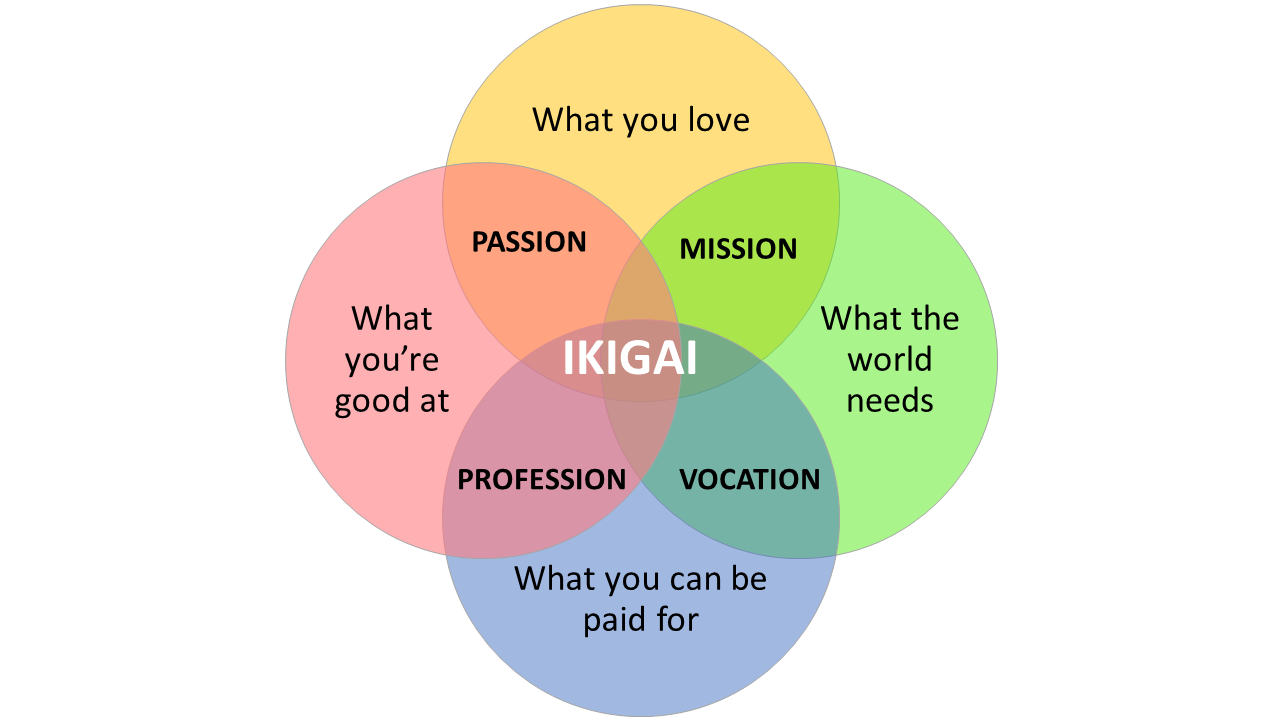
Ok, so this is exciting!
The post below is the first student-authored post to appear on this blog [insert small golf clap here]
It is by Eloise Curtis – a Bachelor of Psychology (Honours) student who also happens to be one of the Student Wellbeing Ambassadors.
Eloise has taken on a topic close to my heart, which is how we find meaning and purpose in life. She draws on a Japanese cultural concept – Ikigai – to do this.
But don’t let me delay you any further in reading it. Enjoy!
Ikigai: A Reason for Being
by Eloise Curtis
I was fresh out of high school when I decided to follow my calling and move to Japan. I spent 6 months volunteering in a caring home for those who had physical and intellectual disabilities, and to this day it is probably the most challenging and rewarding thing I have done with my life.
I wanted a lot from Japan- adventure, independence and freedom, a good dose of culture shock, and most important of all, a chance to view life from an entirely different perspective than what I had come to know in Australia. Japan delivered, no doubt, but I also learnt a lot more than I had been expecting.
There is something truly unique about Japan- I’m not talking about how the public transport runs to the second, nor how complete strangers demonstrate an unrivalled capacity for kindness and consideration towards one another. I’m talking about this unspoken feeling where everything seems to have its place, everything seems to fit. If you’ve been to Japan, maybe you know what I’m struggling to refer to, and if you haven’t, it comes highly recommended.
I later discovered there is a Japanese term known as ‘Ikigai’ (いきがい), translating to ‘one’s reason for being’. I believe this philosophy may pose as some explanation for the above mentioned feeling.
Some of you may already know that having purpose in your life is vital for wellbeing, and the brilliance of Ikigai is that it can be broken down into bitesize questions that help you consider what you want to work towards in your life.

I forgot to mention, before I moved to Japan I had been accepted into the Bachelor of Psychology (Honours) here at Flinders, which I deferred for a year. It was my first course preference, but I hadn’t entirely succeeded in convincing myself it was what I wanted. I had applied because I felt the pressure of the ticking clock and needing to know what I would be doing with my life. I did it because I wanted to have my foot in the door for something when I would return to Australia. This way, I thought, I could put the worry out of my mind while I was busy immersing myself in all the Japanese goodness.
As you could probably guess, this wasn’t the greatest long term plan. I arrived back in Australia literally as Uni classes were beginning and stress levels were at an all-time high. I still hadn’t thought about if this was what I actually wanted to be doing.
This is where Ikigai comes in.

First I asked myself: What am I good at?
I listed my strengths- helping others, creative writing, keeping calm in stressful situations, listening actively, and giving constructive criticism.
Next I thought: What do I love?
Interests and hobbies that make me feel like my authentic self- creative writing, mindfulness, making a positive contribution, problem solving, and quality time with friends and family.
Then: What does the world need?
I considered the bigger picture problems- improved treatment/increased awareness/reduced stigma for mental health, and more effective techniques to help the lives of others be happier and less stressful.
And importantly: What can I be paid for?
Being a psychologist, writing books/online articles, researching self-help and wellbeing, or being a life coach.
Finally it was about finding that sweet spot of how I could bring these 4 factors together: What is my Ikigai?
Answer: To combine psychology and writing to have a positive impact on the lives of others, through teaching techniques to help people help themselves be happier.
This answer was the reaffirmation I was searching for, letting me know I was set on the right path to learn the skills I would need for my future. It was a feeling of relief to have a deeper understanding of my purpose, and I now had a current game plan: become a registered Psychologist.
I truly hope others achieve this same satisfaction from the understanding and relief that Ikigai brings, to be able to answer the tough questions in life, and thus I leave you with my 2 top tips:
- I encourage you to question yourself without margins to find your Ikigai; it is always a good time to do so, and
- Remember that your purpose can and should evolve along with your values and passions; be flexible, and revisit these questions when you feel a need to alter your direction
More tips, prompts, and a worksheet on Ikigai can be found here.

